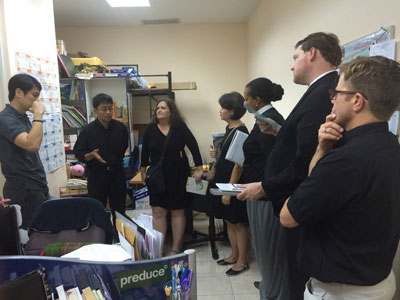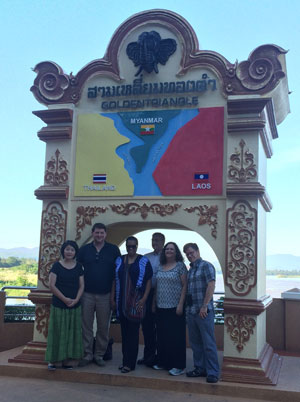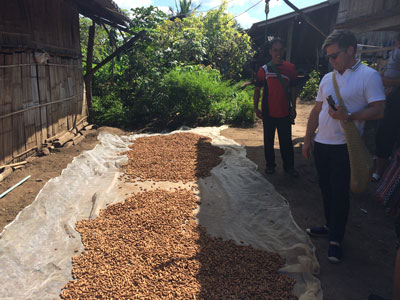A letter from Barry and Shelly Dawson serving as Regional Liaisons for Southeast Asia, based in Thailand
March 2017
Write to Barry Dawson
Write to Shelly Dawson
Individuals: Give to E200493 for Barry and Shelly Dawson’s sending and support
Congregations: Give to D507570 for Barry and Shelly Dawson’s sending and support
Churches are asked to send donations through your congregation’s normal receiving site (this is usually your presbytery).
Dear Mission Partners,
The man ran up to us as we were about to enter a Bangkok hotel restaurant for a 7:00 a.m. breakfast. He obviously had observed the clerical collar that I wear occasionally for high-level meetings with the leadership of church partners. With an unmistakable sense of urgency in his voice, he pleaded, “Pastor, can you come pray for me? I have an interview with the UNHCR (United Nations High Commissioner for Refugees) this morning. Please come and pray with me now.”
Our Presbyterian Church (U.S.A.) delegation quickly followed the beckoning man to a spot in front of the hotel’s sparkling glass doors. We joined hands with his Pakistani family, and then we prayed for him—for courage and for peace, and for the Lord to give him the right words to say that morning to the UNHCR interviewer so that he and his young family could leave behind their seemingly interminable asylum-seeker status in Thailand and resettle in a new country. We prayed together for the resurrection hope of that new life for this stranger—our brother in Christ—one of Bangkok’s thousands of urban refugees.
That early morning encounter was not on our schedule, and yet it was a providential example of the very issues our seminar group would be exploring over the course of the next 10 days. For more than six months, we had been researching, planning, and checking logistical details so we could host and lead a PC(U.S.A.) delegation coming to Thailand to focus on the issues of migration, human trafficking, and labor exploitation.
Protecting Children from Exploitation
During our first day in Bangkok, our group concentrated on church and CSO (civil society organization) efforts to protect children from exploitation. First we received an insightful overview of the objectives of the Child Protection Office of the Church of Christ in Thailand, the PC(U.S.A.)’s primary mission partner. Later we gained valuable knowledge about the strategies and coalition-building efforts of both The Code* and ECPAT (End Child Prostitution in Asian Tourism).
As we met with ECPAT’s executive director and with globally recognized experts in the field of protecting children from sexual exploitation, we were astounded by the shocking statistics that made our hearts cringe, for behind each statistic is a precious child’s life.
• Every 16 seconds a child is sexually abused.
• 7% of the children exploited on the Internet are infants.
• 67% of the abuse images online are posted by persons presumably within the child’s “circle of trust.”
• 37% of the abusive images of children that appear on the Internet are posted by their parents.
• “An estimated 150 million girls and 73 million boys under the age of 18 experience sexual exploitation or other forms of sexual violence,” according to a UN Global Study on Violence against Children.
When confronted with such horrifyingly shameful examples of child sexual exploitation, we wondered, “With the magnitude of the evils being perpetrated, what can one person, one church or one company do to make a difference?
A few important responses to that question emerged out of our briefing.
1. The Church has a key role to play. Christian churches and other faith communities have an enormous amount of influence in the public square. As one leader put it, “ECPAT knows that it cannot end child sexual exploitation if it does not work with faith-based communities, which are the doorway into the family and into the community.”
2. Motivated individuals need to work with coalitions for maximum impact. A key way for churches and change agents to make a difference is by connecting with advocacy networks (e.g., ECPAT and The Code) that have the experts, research, and helpful guidance to maximize their efforts and collective impact.
3. Corporate executives can work to institute policies that raise awareness and set standards to protect children from sexual exploitation related to travel and tourism. Many Presbyterian Church (U.S.A.) members are in executive positions through which they can influence corporate social responsibility initiatives to set high standards for business travel.
Our hope-filled prayer is that congregations and individuals will sense a Spirit-driven call to be catalysts for transformation in the protection of children from sexual exploitation.
Resurrection Hope at the New Life Center, Chiang Mai
The geographical areas that comprise northern Thailand, northeastern Myanmar, northwestern Laos, and the southernmost parts of the Yunnan Province of China are heavily populated with numerous ethnic minorities (sometimes referred to as “hill tribes” in Thailand). Among the ethnic minorities that are often viewed as “target rich” populations for human traffickers are the Karen, Lahu, Lisu, Yao, and Hmong people. The New Life Center (NLC) is a Christian ministry that focuses exclusively on serving the needs of ethnic minority females who have suffered the abuses of trafficking or are now at risk of being trafficked. In addition to providing a safe haven where those in need of compassionate care and trauma healing can begin the road to recovery, the NLC goes into rural villages and presents educational programs to inform communities about the dangers of trafficking.
The NLC took our group of Presbyterian Church (U.S.A.) leaders to visit a remote Lahu village. As we walked around the uneven dirt pathways among the villagers’ modest homes, observed the near-poverty living conditions of its residents, and then shared a meal with members of the community, we witnessed the deep value of NLC’s relational approach to human trafficking prevention. The NLC proactively works to prevent human trafficking by developing close relationships with local community leaders who are encouraged to report at-risk girls and suspicious behaviors of possible trafficking activities. Indeed, we could see a reflection of Jesus’ relational formula of trust and transparency based on love (John 15:12-15) at the heart of the NLC’s strategy for human trafficking prevention.
Realism and Hope
Leading the travel study seminar focused on migration, human trafficking, and the exploitation of children and laborers reminded us of the acute suffering and the daunting challenges that surround such multi-dimensional issues. Yet, equally, we were encouraged by the unwavering determination of many justice-seekers who are working tirelessly to transform lives and bring the joy of God’s kingdom to people who each day struggle for survival. Our group’s intensive 10-day trip around Thailand reminded us of the timeless truths of our faith’s unvarnished assessment of humanity and of the good news of Christ’s transforming love, a love deeply rooted in the gospel’s realism and hope.
Thank You and an Invitation to Partner with Us
As we write this first mission letter of 2017, we are remembering how much we cherish our mission partnerships with you, your church, or your presbytery. We thank you for your encouragement in our ministry, and we invite you to support us throughout this year with your prayers, your correspondence, and your financial gifts, all of which are critically important to our ongoing mission work throughout Southeast Asia.
In Partnership with You,
Barry and Shelly
*The Code is an industry-driven initiative with the mission to provide awareness, tools and support to the tourism industry to prevent the sexual exploitation of children.
![]() You may freely reuse and distribute this article in its entirety for non-commercial purposes in any medium. Please include author attribution, photography credits, and a link to the original article. This work is licensed under a Creative Commons Attribution-NonCommercial-NoDeratives 4.0 International License.
You may freely reuse and distribute this article in its entirety for non-commercial purposes in any medium. Please include author attribution, photography credits, and a link to the original article. This work is licensed under a Creative Commons Attribution-NonCommercial-NoDeratives 4.0 International License.


